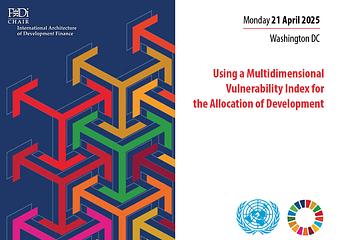










Since its creation, FERDI has extensively worked on country vulnerability - its different forms, its measurement and how it is, or could be, considered in international development financing. FERDI is recognised for its expertise in issues related to country vulnerability and its connections to financing.
In 2018, FERDI set up a thematic chair dedicated to the Sahel. Sahelian in its management and initiatives, this chair has continued its activities in 2023, despite regional crises, with the aim of informing decisions and providing guidance for public policies tailored to local contexts.
↪ To enhance research on Least Developed Countries (LDCs), particularly by improving their identification and the effectiveness of measures taken for them.
↪ To advocate for the consideration of the structural handicaps of LDCs in the design of public development policies.
↪ To develop and expand research on vulnerability indicators.
↪ To support the inclusion of vulnerabilities in international development financing (see the International Financing for Development programme).
↪ To advocate for the joint consideration of security and economic development issues.
↪ FERDI is involved in international discussions on the multidimensional vulnerability index and is continuing its work on vulnerability and resilience.
↪ A vulnerability and resilience observatory is being established, with a website set to launch by the end of 2024.
↪ Under their partnership, FERDI supports the WAEMU Commission in monitoring the vulnerability of member countries.
↪ Following the Interministerial Committee for International Cooperation and Development (CICID) meeting in July 2023, FERDI assisted the French government in developing a method to identify particularly vulnerable priority countries, in addition to the initially selected 45 LDCs. The method proposed by FERDI allows the government to transparently articulate the political decisions for which it is responsible.
↪ FERDI participated in the United Nations Conference on the Least Developed Countries and continues its work on LDCs.
↪ FERDI is involved in the launch of the LDC5 Monitor, a coalition of think tanks and institutions from both the Global North and South. This group aims to provide an independent analysis of the implementation of the Doha agenda, focusing on how it addresses the specific vulnerabilities of LDCs and contributes to their structural transformation. This initiative is supported by Finland and France and has received approval from UN-OHRLLS. As part of this initiative, FERDI will be particularly responsible for monitoring the vulnerability of LDCs.
↪ A new edition of the the book "Out of the Trap: Supporting the Least Developed Countries" is planned, with an afterword examining the impact of recent global crises on LDCs.




